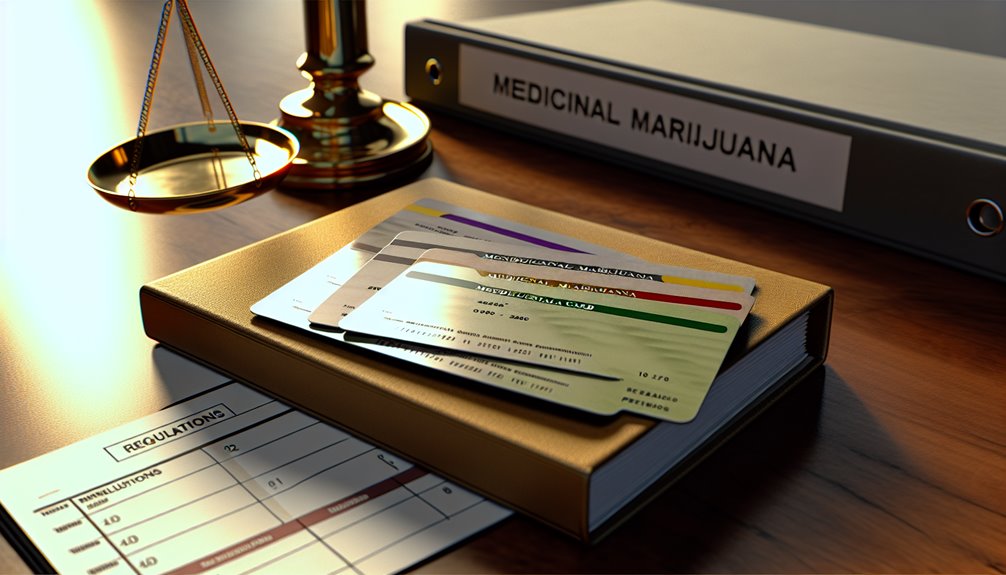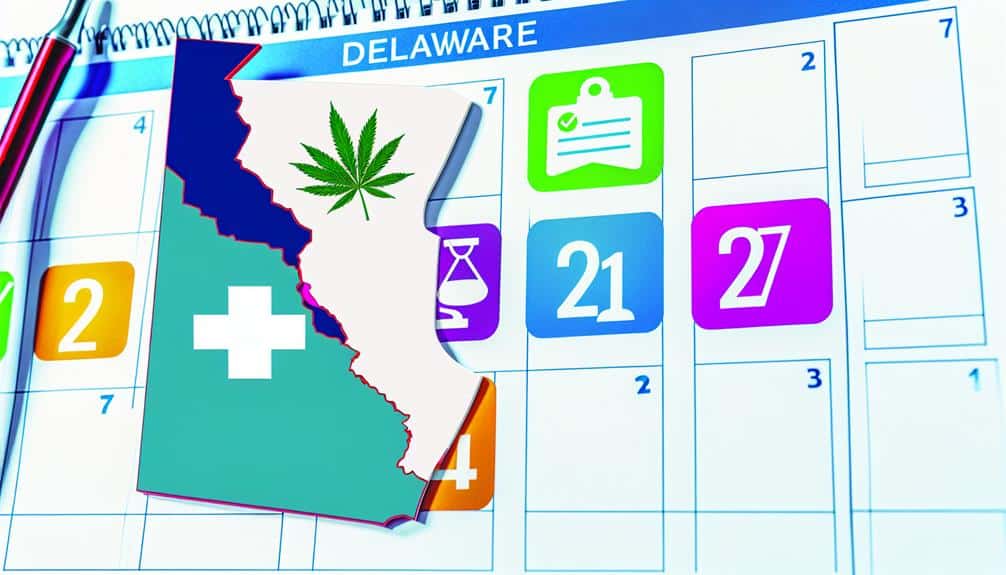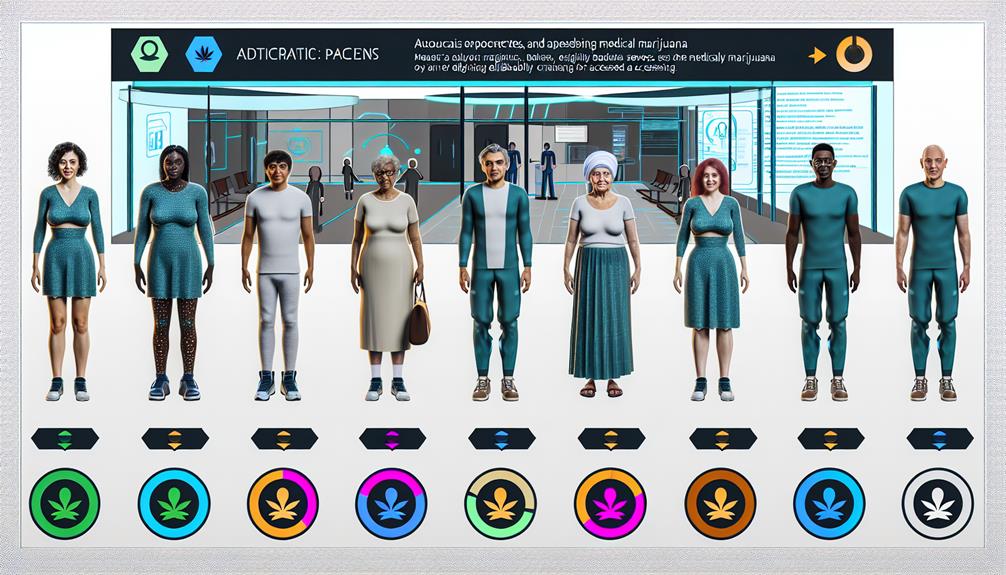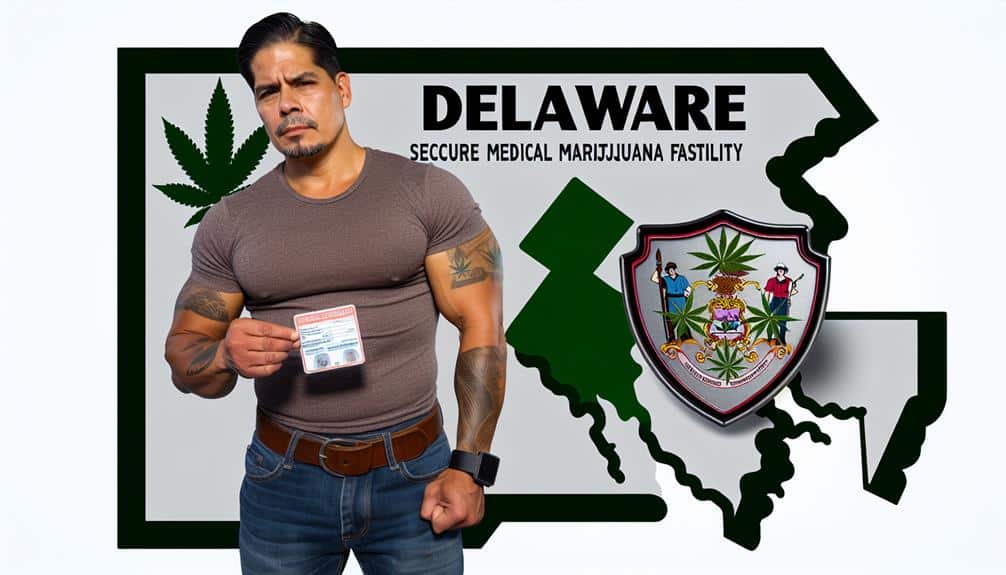When you choose a 1-, 2-, or 3-year MMJ card, you’re balancing convenience, cost, and compliance. Longer terms cut renewal hassle but lock in assumptions about stable symptoms, dosing, and state rules. Shorter terms invite more frequent clinical reassessment and updated documentation. You’ll also need to weigh cumulative fees, shifting regulations, and risks if laws change mid-term. The right pick starts with your condition’s trajectory—and whether your state even allows multi-year cards. Here’s how to decide.
How MMJ Card Durations Work Across States

Across the U.S., medical marijuana card durations hinge on state law, creating renewal timelines that range from frequent to multi-year. You’ll navigate state specific regulations that set standard 12‑month validity in most jurisdictions, with defined renewal procedures to preserve continuous legal access. Some states diverge: Florida requires physician “orders” renewed about every 210 days while the MMJ card follows a separate cycle; Oklahoma and Arizona may authorize 2‑year cards when clinically and regulatorily appropriate. Missouri now issues 3‑year patient and cultivation IDs approved after December 2022, replacing prior one‑year terms. Illinois offers 1‑, 2‑, or 3‑year options. Remember, the printed card expiration controls dispensary purchasing. Use remains lawful through the expiration date; afterward, protections lapse immediately—so initiate early renewal to prevent gaps. Patients should note that federal classification of cannabis as a controlled substance remains unchanged, even when holding a valid state medical card.
Cost Breakdown: 1-Year vs. 2-Year vs. 3-Year Cards
While program rules vary by state, the cost calculus is straightforward: longer-term MMJ cards usually lower your per‑year expense and cut renewal friction. Here’s a cost breakdown grounded in a fee comparison you can apply to program budgeting and patient counseling. In Illinois, regular patient fees are $50 (1‑year), $100 (2‑year), and $125 (3‑year). On a per‑year basis, that’s $50 vs. $50 vs. $41.67. Reduced‑fee patients pay $25, $50, and $75, respectively (per‑year: $25, $25, $25). Caregivers track the same schedule; adding one caregiver yields $75 (1‑year), $150 (2‑year), $200 (3‑year). Multi‑year cards avoid cumulative annual fees (e.g., $125 vs. $150 over three 1‑year cycles). Account for separate physician consultation charges and any renewal‑specific fees (e.g., Illinois $50 tri‑annual). Cardholders also gain legal protection and access to licensed dispensaries, which can influence the overall value of choosing a multi‑year option.
Convenience and Renewal Frequency

Beyond per‑year savings, renewal cadence dictates day‑to‑day convenience. Annual renewals mean more appointments, document uploads, and certification checks—each touchpoint adds administrative risk, including missed deadlines and temporary access lapses. Moving to 2- or 3‑year cards reduces scheduling churn, improves renewal efficiency, and minimizes disruptions by lengthening validity. However, fewer renewals can dilute patient engagement unless you implement reminders and maintain routine clinical follow‑ups.
Most states now require online submissions through government portals, requesting current physician certifications, ID, and address verification. Digital workflows accelerate approvals—some states issue cards immediately—yet they rely on internet access and digital literacy. Align certification dates with card terms to avoid mismatches. Expect consolidated, less frequent fees, though per‑event costs may rise; budget for caregiver or cultivation add‑ons that renew in parallel.
Medical Stability and Changing Treatment Needs
Even with a multi‑year MMJ card, your clinical status and dosing needs won’t stay static, so you should plan for structured reassessment under your state’s regulations. You’ll likely experience treatment variability across conditions—chronic noncancer pain, cancer pain, insomnia, and anxiety respond differently—and patient-reported outcomes may outpace objective scales (e.g., MS spasticity). Expect dosage adjustments: mean daily THC often rises over time, reflecting evolving symptom control or tolerance, which warrants careful titration and monitoring of adverse events.
- Align review intervals with mandated follow-ups to recalibrate product type, delivery route, and dose using standardized PROs and clinical findings.
- Track substitution/augmentation of other medications to maintain safety and clarify net benefit.
- Prioritize weight, function, and side-effect surveillance to sustain gains while preventing escalation beyond therapeutic necessity.
Legal and Regulatory Risks Over Multi-Year Terms

Although a multi-year MMJ card promises continuity, the legal ground beneath it can shift, and you’re responsible for staying compliant. You face legal risks from federal Schedule I status regardless of state authorization. States frequently enact regulatory changes that shorten validity, tighten eligibility, or alter renewal procedures, potentially voiding a card mid-term. Cross-state recognition is limited; traveling with cannabis can trigger penalties despite an active card. Some jurisdictions require in-person evaluations or physical card possession; noncompliance invites citations or fines.
Expect evolving fees, documentation, and tracking rules. Data sharing with dispensaries and electronic monitoring can expand, raising confidentiality concerns. If oversight bodies are modified or removed, guidance may decline. Build safeguards: verify state rules quarterly, document dosing and purchases, meet renewal windows, and carry required identification.
Insurance, Taxes, and Reimbursement Considerations
While an MMJ card can legitimize access to treatment under state law, you should plan finances assuming insurers won’t pay for cannabis. Health plans rarely cover product costs, so you’ll face out‑of‑pocket spending regardless of insurance status. Consider insurance implications separately: MMJ status typically doesn’t change health premiums, but life insurers may rate use and comorbidities. Multi-year cards can support financial planning by stabilizing renewal fees and enabling consistent documentation.
- Leverage tax exemptions where available (e.g., medical vs. recreational excise taxes), but confirm residency rules and reciprocity limits.
- Anticipate reimbursement challenges: most plans exclude cannabis; employee or nonprofit aid is variable and documentation-heavy.
- Optimize renewals: multi-year terms reduce administrative costs, and some programs offer income-based fee reductions or waivers.
Maintain records to support eligibility determinations and any jurisdiction-specific deductions.
Patient Profiles: Who Benefits From Each Duration

Choosing a 1-, 2-, or 3-year MMJ card should align with your clinical trajectory, documentation strength, and regulatory risk tolerance. For patient profiles with chronic, well-documented conditions and stable protocols, a 3-year card reduces renewal burden, prevents access gaps, and supports adherence when physicians confirm condition persistence. If your needs fluctuate, a 1-year term enables timely treatment assessments, updated certifications, and lower upfront costs, while avoiding unnecessary exposure during remission. Limited mobility or rural access favors longer validity to minimize travel, administrative delays, and interruptions, especially when telemedicine is permissible. Pediatric patients typically need shorter terms (often ≤2 years) synchronized with caregiver certifications to satisfy oversight statutes. When regulatory environments shift or relocation is likely, annual cards maintain compliance flexibility and reduce policy-change risk.
Tips for Choosing the Right Term for Your Situation
Before you pick a 1-, 2-, or 3-year MMJ term, map your clinical stability, documentation strength, and state rules against total cost of ownership. Start with patient education: confirm whether your state permits multi-year cards, mandates provider re-certification each renewal, and applies state fees or reciprocity limits. Then complete financial planning: annualize provider consults, renewal fees, travel, and time off work. Stable, chronic conditions often suit multi-year terms; fluctuating conditions may justify 1-year oversight.
- Compare annualized costs: one-year cards have lower upfront fees but higher cumulative renewals; multi-year cards lower annualized spend and reduce indirect costs.
- Align compliance risk with convenience: fewer renewals mean fewer lapse points, but longer intervals require vigilant status tracking.
- Integrate provider guidance: consider monitoring needs and legal possession-limit implications.
Renewal Timing, Documentation, and Provider Coordination

Because uninterrupted access depends on timing and compliance, start your renewal at least 30 days before expiration and confirm your state’s rules on certification intervals and fees. Use renewal reminders from the state portal and your clinic to avoid lapses; late submissions can trigger a full reapplication and weeks without access. Maintain accurate documentation: current provider certification, proof of residency, qualifying condition records, and updated personal information. Pay renewal fees promptly to prevent activation delays.
Prioritize provider communication early. Schedule a telemedicine or in‑person visit with a state‑registered practitioner to verify ongoing eligibility; continuity is optional if any authorized provider can certify you. Leverage public provider directories when needed. Submit certifications and payment through the official portal; most programs issue digital approvals rapidly, activating as the prior card expires.
Conclusion
As part of the Cannabis Docs of Delaware team, I’ll be honest: the best choice for you depends on your comfort with risk, costs, and how steady your plan stays over time. If you value simplicity, the longest MMJ term can be attractive; if you prefer flexibility, annual renewals might feel right. Either way, we’ll help you balance cost, compliance, and clinical stability, keeping your records organized and your provider in the loop. If you have questions, want to compare options, or need help planning renewal timelines, please reach out. Visit Cannabis Docs of Delaware to learn more, or give us a call at (855) 420-6797. We’re here to help you navigate the process with you and your wellbeing in mind.
The post Multi-Year MMJ Cards: Choosing Between 1-, 2-, or 3-Year Validity Options appeared first on Delaware Cannabis Docs.
source https://delawarecannabisdocs.com/multi-year-mmj-cards-validity-options/























